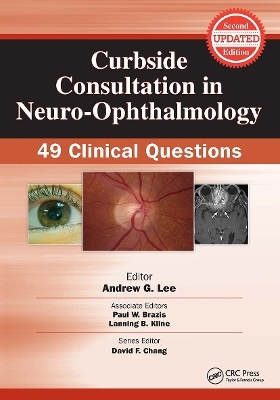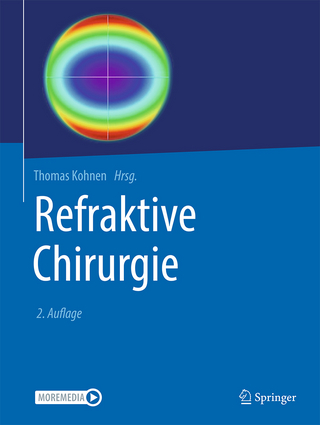
Curbside Consultation in Neuro-Ophthalmology
SLACK Incorporated (Verlag)
978-1-61711-637-7 (ISBN)
Curbside Consultation in Neuro-Ophthalmology has been updated into a Second Edition!
The Second Edition contains new questions and is completely updated!
Curbside Consultation in Neuro-Ophthalmology: 49 Clinical Questions, Second Edition contains new questions and brief, practical, evidence-based answers to the most frequently asked questions that are posed during a “curbside consultation” between surgical colleagues.
Dr. Andrew G. Lee and associate editors Dr. Paul W. Brazis and Dr. Lanning B. Kline have designed this unique reference in which neuro-ophthalmologists offer expert advice, preferences, and opinions on tough clinical questions commonly associated with neuro-ophthalmology. The unique Q&A format provides quick access to current information related to neuro-ophthalmology with the simplicity of a conversation between two colleagues. Images, diagrams, and references are included to enhance the text and to illustrate common clinical dilemmas.
Some of the questions that are answered inside theSecond Editioninclude:
What is the evaluation for papilledema?
What is the work up for third nerve palsy?
What is the treatment for giant cell arteritis?
What is the evaluation for optic disc edema with a macular star?
What is the evaluation for anisocoria?
Curbside Consultation in Neuro-Ophthalmology: 49 Clinical Questions, Second Edition provides information basic enough for residents while also incorporating expert pearls that even high-volume ophthalmologists will appreciate. Residents, fellows, and practicing physicians alike will benefit from the user-friendly, casual format and the expert advice contained within.
Andrew G. Lee, MD is chair of the Department of Ophthalmology at the Jack S. Blanton Eye Institute of the Houston Methodist Hospital in the Texas Medical Center. He is Professor of Ophthalmology, Neurology, and Neurosurgery at Weill Cornell Medical College in New York; Adjunct Professor of Ophthalmology at the University of Iowa in Iowa City and at Baylor College of Medicine in Houston, Texas; and Clinical Professor at the University of Texas Medical Branch in Galveston, the University of Texas MD Anderson Cancer Center in Houston, and the University of Buffalo, SUNY in New York. Dr. Lee has served on the national and international editorial board of 15 journals including Archives of Ophthalmology, American Journal of Ophthalmology, Canadian Journal of Ophthalmology, Japanese Journal of Ophthalmology, Journal of Neuro-Ophthalmology, Survey of Ophthalmology, and Eye and is the Editor-in-Chief of the Journal of Clinical and Academic Ophthalmology. He has published over 380 peer-reviewed publications, 40 book chapters, and 9 full textbooks in ophthalmology. He has been the invited speaker at over 350 national and international eye meetings and has given 12 named lectureships. Dr. Lee has a special interest in graduate medical education and has received the resident teaching award 6 times at 5 different academic institutions.
Dedication Acknowledgments About the Editor About the Associate Editors Contributing Authors Introduction Question 1 How Should a Childhood Optic Nerve Glioma Be Worked Up? Mark Borchert, MD Question 2 How Should a Meningioma of the Optic Nerve Sheath Be Managed? . Neil R. Miller, MD Question 3 When Should You Consider the Diagnosis of Neuromyelitis Optica? Fiona Costello, MD, FRCPC and Jodie M. Burton, MD, MSc, FRCPC Question 4 How Should I Evaluate and Manage Suspected Optic Neuritis? Eric Eggenberger, DO, MSEpi Question 5 What Is the Treatment of Optic Neuritis? Melissa W. Ko, MD Question 6 What Is the Workup and Treatment for Neuroretinitis? Karl Golnik, MD and Amina Malik, MD Question 7 How Do You Evaluate and Treat Nonarteritic Anterior Ischemic Optic Neuropathy? M. Tariq Bhatti, MD Question 8 How Do You Differentiate Arteritic From Nonarteritic Anterior Ischemic Optic Neuropathy? Rod Foroozan, MD Question 9 How Should I Treat Giant Cell Arteritis? Jacqueline Leavitt, MD Question 10 What Is the Evaluation of Traumatic Optic Neuropathy? Nicholas Volpe, MD and Jennifer K. Hall, MD Question 11 What Is the Evaluation and Management for Papilledema? Michael Wall, MD Question 12 Is There a Difference in the Management of Pseudotumor Cerebri in Pregnancy? Kathleen B. Digre, MD Question 13 What Is the Evaluation and Management of Low- and High-Flow Carotid Cavernous Fistulas? Victoria S. Pelak, MD; Emily M. Bratton, MD; and James A. Dixon, MD Question 14 How Do I Work Up and Manage an Internuclear Ophthalmoplegia? Christopher C. Glisson, DO, MS and David I. Kaufman, DO Question 15 What Is the Workup and Treatment of Myasthenia Gravis? Leah Levi, MBBS Question 16 How Do You Manage Visual Loss in Thyroid Eye Disease? James A. Garrity, MD Question 17 When Do You Use Radiation or Steroids in Thyroid Eye Disease? Steven E. Feldon, MD, MBA Question 18 How Do You Manage Diplopia in Thyroid Eye Disease? Kimberly Cockerham, MD, FACS Question 19 What Are the Evaluations and Treatments for Acquired Nystagmus? Janet C. Rucker, MD Question 20 What Is the Evaluation for Anisocoria? Sophia Chung, MD and Aaron Grant, MD Question 21 How and When Should I Work Up Horner Syndrome? Sachin Kedar, MBBS, MD and Valérie Biousse, MD Question 22 What Should I Do With a Dilated Pupil? Randy Kardon, MD, PhD Question 23 What Is the Evaluation for Episodic Anisocoria? Aki Kawasaki, MD, PhD Question 24 How Do You Manage Toxic and Nutritional Optic Neuropathies? Alfredo A. Sadun, MD, PhD and Michelle Y. Wang, MD, PhD Question 25 What Are Visual Processing Defects and How Can I Recognize Them? Swaraj Bose, MD Question 26 How Do I Manage Patients With Headache Syndromes Who Come to Me as an Ophthalmologist? Deborah I. Friedman, MD, MPH Question 27 What Is the Evaluation of Optic Atrophy? Julie Falardeau, MD Question 28 How Do I Treat a Child With Asymmetric Nystagmus? Madhura A. Tamhankar, MD and Grant T. Liu, MD Question 29 What Is Opsoclonus and How Do I Manage It? Steve Newman, MD Question 30 What Is Wernicke Encephalopathy and How Does It Affect the Eye? Lina Nagia, DO and James Corbett, MD Question 31 How Do I Manage Postoperative Visual Loss After Nonocular Surgery? Wayne Cornblath, MD Question 32 How Do I Manage Transient Monocular Visual Loss in a Young, Otherwise Healthy Patient? Rosa Ana Tang, MD, MPH and Roberto A. Cruz, MD Question 33 What Is the Evaluation for Transient Monocular Visual Loss in an Older Adult?9 Byron L. Lam, MD Question 34 What Is the Evaluation for a Homonymous Hemianopia? Jonathan C. Horton, MD, PhD Question 35 What Is the Evaluation for a Painful Third Nerve Palsy Without a Fixed and Dilated Pupil but With Anisocoria (Partial Pupillary Involvement)? Michael S. Vaphiades, DO Question 36 How Do You Manage an Isolated and Presumed Vasculopathic, Pupil-Sparing Third Nerve Palsy? Tom Carlow, MD Question 37 What Is the Appropriate Evaluation of a Fourth Nerve Palsy? Robert L. Tomsak, MD, PhD and Matthew J. Thurtell, MBBS, FRACP Question 38 What Is the Appropriate Evaluation in a Patient Suspected of Having a Sixth Nerve Palsy? Steven R. Hamilton, MD Question 39 How Do I Evaluate a Patient With Multiple Ocular Motor Cranial Nerve Palsies? Marc Dinkin, MD and Gregory S. Kosmorsky, DO Question 40 What Is Blepharospasm? Sushma Yalamanchili, MD and Angelina Espino, MD Question 41 What Is Hemifacial Spasm? Andrew R. Harrison, MD; Benin Barahimi, MD; and Michael S. Lee, MD Question 42 How Do You Deal With Nonorganic Visual Loss? Robert L. Lesser, MD Question 43 How Do You Diagnose and Manage Migraine Aura? Robert H. Spector, MD Question 44 How Do I Recognize Leber Hereditary Optic Neuropathy? Nancy J. Newman, MD Question 45 How Do I Manage an Orbital Apex Syndrome? Roger E. Turbin, MD, FACS Question 46 How Do I Evaluate and Manage Idiopathic Orbital Inflammatory Syndrome? Timothy James McCulley, MD Question 47 How Do I Manage the Low-Flow Carotid Cavernous Fistula? Leah Levi, MBBS Question 48 How Do I Evaluate and Treat Radiation Optic Neuropathy? Anne Abel, MD and Michael S. Lee, MD Question 49 What Should I Do With a Seventh Nerve Palsy? Matthew J. Thurtell, MBBS, FRACP Financial Disclosures Index
| Erscheint lt. Verlag | 30.3.2015 |
|---|---|
| Reihe/Serie | Curbside Consultation in Ophthalmology |
| Sprache | englisch |
| Maße | 178 x 254 mm |
| Gewicht | 598 g |
| Themenwelt | Medizin / Pharmazie ► Medizinische Fachgebiete ► Augenheilkunde |
| Medizin / Pharmazie ► Medizinische Fachgebiete ► Neurologie | |
| ISBN-10 | 1-61711-637-8 / 1617116378 |
| ISBN-13 | 978-1-61711-637-7 / 9781617116377 |
| Zustand | Neuware |
| Haben Sie eine Frage zum Produkt? |
aus dem Bereich


